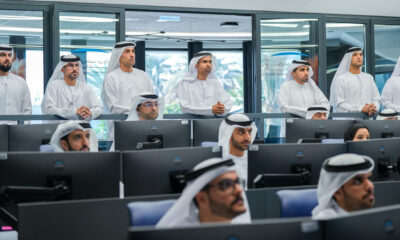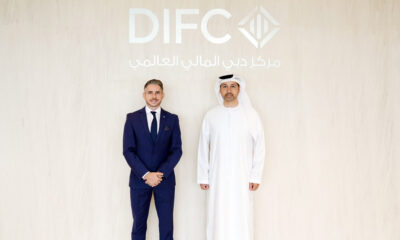News
Dubai Police Use Futuristic Technology To Read Murder Suspect’s Mind

A recently solved murder case in Dubai shows that science fiction movies have become a reality. Instead of traditional methods, the Dubai Police solved the case using a new technology developed by Brainwave Science, Inc, which makes it possible to literary read the minds of crime suspects.
This technology is called iCognative, but those familiar with it often call it “memory print” or “brain fingerprinting.” The science behind it is fairly easy to understand. When the human brain recognizes a known object, image, or piece of information, it involuntarily emits the so-called P300 wave.
The P300 wave is an event-related brain potential that can be measured using electroencephalography (EEG), and that’s exactly what iCognative does.
“We used the technology in a murder at a warehouse. Experts showed [the workers] pictures related to the crime, which only the person who committed it would know,” said Lt Colonel Mohammad Al Hammadi, Director of Criminology for Dubai Police. “After the session, the [brain mapping] device helped identify the main suspect who then admitted to having committed the murder.”
Lt Colonel Mohammad Al Hammadi has confirmed that the Dubai Police will continue using iCognative when solving future crimes. Other law enforcement agencies around the globe are also trialing the technology, while others, such as India’s police force, have been using it for years.
Also Read: Hyperloop Video Provides A Peek At The Future Of Transportation
The technique for the detection of concealed information with event-related brain potentials was pioneered by American neuroscientist Lawrence A. Farwell, who described its potential for lie detection in his 2012 research paper.
If you would like to see a real convicted murderer, Steven Avery, be brain fingerprinted by Lawrence A. Farwell, you can watch the second season of Netflix’s “Making of a Murderer“. If this isn’t good use of science fiction, then I don’t know what is.
News
Alienware Just Announced Six New Gaming Monitors
The new models include three QD-OLED and three budget-friendly QHD options, expanding the company’s lineup for all gamers.

Alienware has just updated its gaming monitor lineup with six new additions, including the highly anticipated Alienware 27 4K QD-OLED Monitor. The latest wave of releases is set to reach more gamers than ever, offering high-end QD-OLED displays alongside more budget-friendly options.
The latest displays clearly show that the company is doubling down on QD-OLED with three new models sporting the technology. A redesigned Alienware 34 Ultra-Wide QD-OLED Monitor is also making a return, further refining what is already a fan-favorite display.
A Unified Design: The AW30 Aesthetic
All six monitors feature Alienware’s new AW30 design language, first introduced at CES. The AW30 aesthetic brings a futuristic, minimalist look that unites the entire lineup under a cohesive visual identity.
Pushing QD-OLED Even Further
The refreshed Alienware 34 Ultra-Wide QD-OLED Monitor (AW3425DW) builds on its predecessor’s success with a 240Hz refresh rate (up from 175Hz) and HDMI 2.1 FRL support. It also gains G-SYNC Compatible certification alongside AMD FreeSync Premium Pro and VESA AdaptiveSync, ensuring ultra-smooth performance. With a WQHD (3440×1440) resolution and an 1800R curve, this display enhances immersion for both gaming and cinematic experiences.
For those who crave speed, the Alienware 27 280Hz QD-OLED Monitor (AW2725D) pairs a high refresh rate with QHD resolution, balancing sharp visuals with ultra-smooth gameplay. Meanwhile, the Alienware 27 4K QD-OLED Monitor (AW2725Q) delivers stunning clarity with an industry-leading pixel density of 166 PPI, making it the sharpest OLED or QD-OLED monitor available.
Also Read: Infinite Reality Acquires Napster In $207 Million Deal
Worried about OLED burn-in? Alienware’s entire QD-OLED lineup comes with a three-year limited warranty covering burn-in concerns, offering peace of mind for gamers investing in these high-end displays.
Bringing QHD To A Wider Audience
Alongside QD-OLED, Alienware is also releasing three new QHD gaming monitors aimed at more price-conscious gamers. The Alienware 34 Gaming Monitor (AW3425DWM), Alienware 32 Gaming Monitor (AW3225DM), and Alienware 27 Gaming Monitor (AW2725DM) provide a range of sizes and formats to suit different preferences:
- The Alienware 34 Gaming Monitor (AW3425DWM): An ultrawide (WQHD) option for a panoramic, immersive experience.
- The Alienware 32 Gaming Monitor (AW3225DM): A standard 16:9 panel for a traditional but expansive desktop setup.
- The Alienware 27 Gaming Monitor (AW2725DM): A 27” display offering the same performance in a more compact form factor.
All three gaming monitors feature a fast 180 Hz refresh rate, a 1ms gray-to-gray response time, and support for NVIDIA G-SYNC, AMD FreeSync, and VESA AdaptiveSync to eliminate screen tearing. Additionally, with 95% DCI-P3 color coverage and VESA DisplayHDR400 certification, these displays deliver vibrant colors and high dynamic range for lifelike visuals.



























